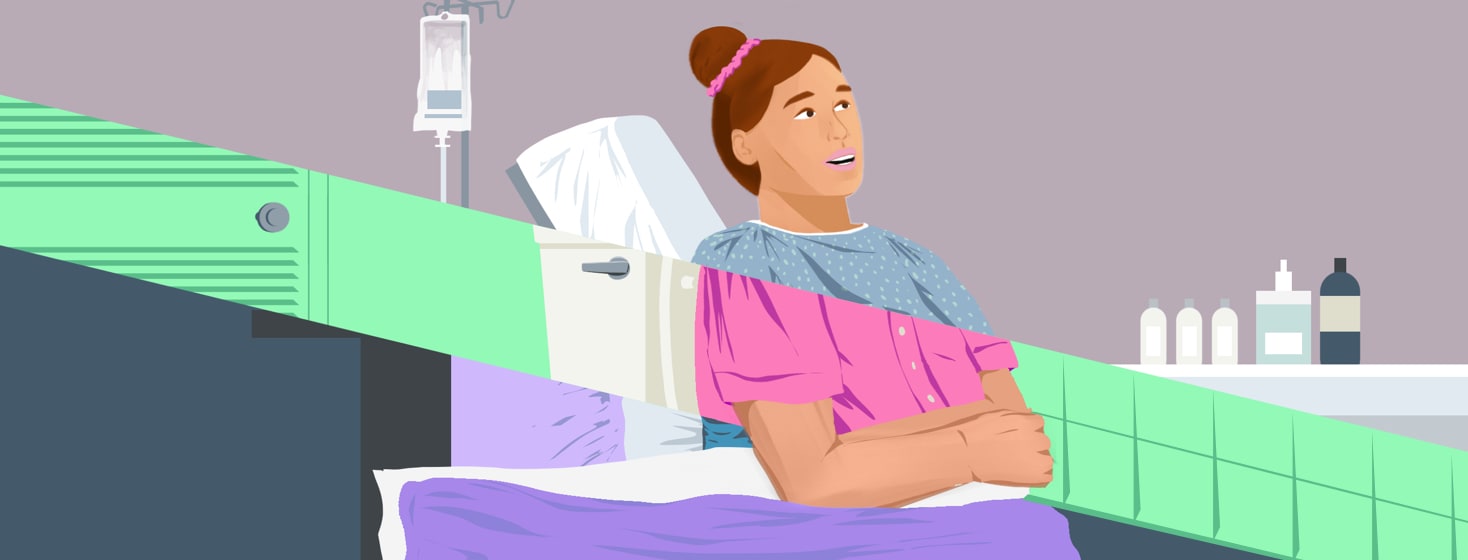Coping Strategies During A Flare Up
Flares can be life-altering and completely rock you to your core, especially if it is your first flare. If you have Crohn's or ulcerative colitis, your flares can also be unpredictable not only in timing, but in how they present themselves. Personally, I experienced 6 flares in 5 years when I was first diagnosed with Crohn's, all of which required hospitalizations, and every one was completely different.
Flares and symptoms
My first flare came almost 2 years after I was diagnosed with Crohn's (hard to believe, but my Crohn's was discovered accidentally). I didn't even know I was in a flare until my doctor sent me to the ER due to severe bloating and abdominal pain. A quick CT scan showed I had an abscess the size of a golfball on my ilium, leading to a 3 week stay in the hospital to shrink it and have bowel rest.
Other flares have presented themselves with high fevers, joint pain, continuous vomiting, and diarrhea, but not all at once. It has always been a guessing game of whether my symptoms were Crohn's related, or a stomach bug or flu. It's amazing how, despite living with a disease for almost 15 years, it is still a mystery as to why my body feels a certain way.
The emotional toll
But, despite the various symptoms I experience physically during a flare, the one thing that is always constant is how I feel emotionally. I feel discouraged, frustrated, disgusted, scared, angry, stressed, and sad. And, sometimes, I even feel a little bit of denial because I truly cannot believe that another flare is happening again.
I have developed ways to cope with my flares, both physically and emotionally, and hope you can benefit from implementing at least one of these tips during your next flare.
Coping with flares
Pain relief
It's ok to take medication to ease your pain. It's ok to ask the hospital staff for stronger meds to help get you through some of those sleepless nights. Don't feel like you have to be the hero and tough it out--medication is there for a reason. However, I have to post this disclaimer that many times, hospitals will resist giving you pain meds because they may think you are just there for drug seeking reasons. It is infuriating and upsetting, but certain patients have ruined it for others, so be patient and convey your pain level with as much detail as possible and you should receive the treatment you need.
Symptom management
Sometimes flares occur without the need for a hospital stay, which is great, however that means our daily life has to continue as usual which can be difficult when experiencing stomach pain and diarrhea. Managing symptoms while going through a flare is critical, and it can be as simple as taking an Imodium before leaving the house or packing an "emergency kit" containing wipes, a fresh pair of underwear, and extra medication should you have an accident.
Symptom management also means choosing the safest foods to eat while in a flare such as low residue foods like pasta, bananas, lean protein, and potatoes. While no two people are alike and we all tolerate foods differently, it is important to reintroduce one food at a time to ensure you can tolerate it and to consult with your doctor if you are a more restricted diet or have a unique case.
Self-care
Self-care is important both mentally and physically. Giving yourself grace to overcome a flare and get back on your feet can do wonders for both the mind and body. Rest more, take breaks. If you return to work soon after a hospital stay, start by working a half day and gradually add hours if you company allows it. Understand that you will not immediately go back to the person you were prior to your flare, and that is ok. Rebuilding from the inside out is crucial both during and after a flare in order to prevent potential setbacks, as well as mental anguish and stress.
One of my favorite things to do after being hospitalized for a flare was to book a massage since eating wasn't always safe or enjoyable and the massage allowed my body and mind to rest and heal. It's amazing what a few minutes of massage, deep breathing, stretching, and/or meditating can do when fighting through a flare.

Stress management
Along the same lines of how beneficial a 60-minute massage can be to the body and mind, keeping stress levels to a minimum is especially important when suffering through a flare. It is unnerving to see blood in the toilet, or suddenly not be able to leave the house for a few days due to extreme intestinal pain, but remaining calm is a key component to the healing process. And while stress doesn't necessarily cause a flare, it does cause inflammation and can cause urgency (thanks to the gut-brain connection) which will prevent you from recovering and feeling well sooner than later.
Creating a blissful bathroom environment can also help during flares, such as lighting scented candles, using moisturizing wipes, and playing soothing music. Avoid looking up information on flares or doing a deep dive on IBD during these times as it can only cause more worry rather than providing solutions.
Seek the help you need
At the end of the day, you know your body best and it is always best to consult with your doctor first should you be experiencing flare-like symptoms. And, since flares can present themselves differently, never second guess your decision to seek medical attention as something that can seem minor can actually be more serious. I hope these tips help get you through tough times and can get you to the other side of your flare feeling less stressed, more prepared, and more in control over your body.

Join the conversation